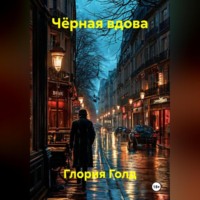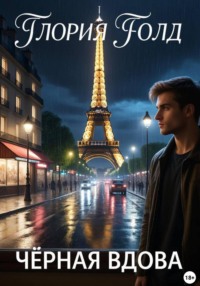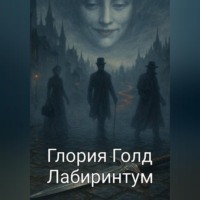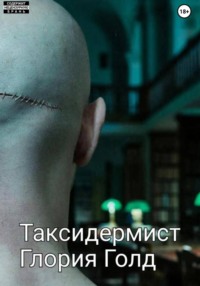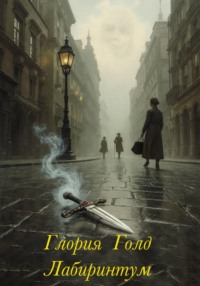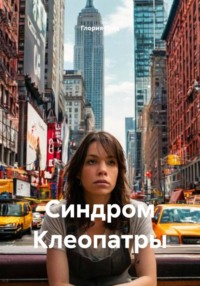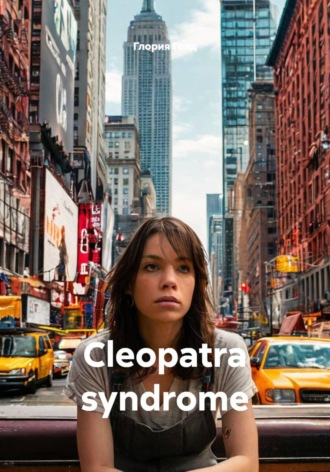
Полная версия
Cleopatra syndrome

Глория Голд
Cleopatra syndrome
Prologue. The City That Doesn't Sleep
New York was not a city, but a state of matter. Steam from manholes, poisonous exhaust, the vapors from millions of bodies rushing somewhere in their blind oblivion. It absorbed dreams, ground them into dust, and spat them back out, like sunflower seed husks on the sidewalk outside “Bob's Diner”. The night here was never truly black—it was diluted by the neon poison of signs, the bloody glow of advertisement lights, and the dim, sickly radiance of street lamps, around which swarmed midges and the ghosts of unfulfilled hopes.
Part One. Shadows Without a Body
Chapter 1. The Morning Ritual
She shuddered and opened her eyes. Not woke up – specifically shuddered, as if an invisible hand had ripped the blanket of nightmare off her. Her pupils slowly focused on the ceiling, smeared with shadows from the streetlamp outside. The shadows shifted, living their own life, independent of physical laws. One of them, long and thin, stretched from the dresser to the bed, like a finger pointing at her.
Her heart pounded in her chest, echoing in her temples with dull thuds. She sat up, leaning on her elbows. The room was the same as always – tiny, with peeling wallpaper, crammed with cheap particleboard furniture. But today, something alien hung in the air. A sweetish smell of unfamiliar cologne mixed with the familiar scents of mustiness and loneliness.
– Home, sweet home! – she sang under her breath, and it sounded like a spell, an attempt to convince herself of the reality of what was happening. She jumped out of bed sharply, tripping over a velvet dress of a lilac, almost black in this light, color, lying on the floor next to stockings and lace underwear. The clothes lay unnaturally, as if someone's skin had been ripped off. A small spot darkened on the floor by the bed. She bent down, touched it with her fingers. Sticky. Reddish-brown. Paint? Or… She jerked her hand back as if burned.
In the bathroom, looking in the mirror, she recoiled. A stranger was staring back at her from the other side of the glass. Short, white hair, like a clown's wig preparing for its final, most tragic performance. Bright, almost garish makeup – a mask for the nightly ritual. The eyeliner created a cat-eye effect, but those eyes were empty, bottomless. With a snarl more like a moan, she tore off the wig, revealing dark, sweat-damp hair. The hot shower washed away the mascara and eyeshadow, which streamed down her face in black-purple rivulets, mixing with water and tears. She stood under the spray, trying to burn the memory of yesterday from her skin, a day she couldn't remember. The water was almost scalding, but inside her remained a coldness. An icy lump in her chest that even boiling water couldn't melt.
The parrot in its cage flapped its wings upon seeing her.
– Hiiii, Cleo! – it screeched. Its voice was like the creak of a rusty door in an abandoned house.
– Hello, sweetie, – her finger, thin and pale, stroked the bright feathers. Contact. The only thing that felt real in this world of shadows.
– What did I do again? Huh? Did you see?
The bird was silent, only tilting its head as if trying to understand. She poured it some food, her hands still trembling.
Chapter 2. “Bob's” – A Purgatory on the Outskirts
“Bob's Diner” was a kind of purgatory. It didn't just smell of grease and sweat, but of concentrated despair. The despair of those who had lost, those who had given up, and those who were still holding on but could already feel the ground slipping away from under their feet. The neon light picked out sticky table tops, worn-out seats, and the customers' faces – masks of fatigue and disappointment from the semi-darkness. The air was thick enough to be cut with a knife – a mixture of fried onions, old oil, and human hopelessness.
Bob, a fat African – American, his skin gleaming under the neon light like wet clay, rasped without looking at her, wiping the greasy counter with a rag of indeterminate color:
– Late again. Oughta fire you! I'm running a business, not a charity for provincial Cinderellas.
Cleo blew him an air kiss, a gesture that reeked of icy mockery, and pinned the badge to her apron: “Cleo Duval”. She fluttered between the tables, taking orders, collecting tips, and hungry glances. A brunette with thick bangs and emerald, slightly slanted eyes, in which hidden pain swirled. Her smile was dazzling, a strained mask behind which emptiness hid. She was a ghost playing the role of a waitress. Her movements were polished, automatic. The smile – on time. The joke – appropriate. But inside was only a vacuum-like silence, occasionally disturbed by the echo of forgotten nightmares.
Today, there were two new faces in the diner. A man in his fifties, in a crumpled asphalt-colored trench coat, sat at the counter. His name was Detective Miles Hawthorne. His face resembled a relief map of a terrain suffering endless rains and hurricanes. Deep wrinkles, bags under eyes where sleep had drowned. Next to him was his young partner, Detective Nick Rivera, still believing in the world's justice and order, with a clean-shaven face and a clear, not-yet-extinguished gaze. They were drinking coffee that more closely resembled liquid mud.
– This shit again, – Hawthorne grumbled, pushing the cup away. His voice was hoarse, saturated with smoke and cynicism.
– Third one this month. Same M.O. All in cheap motels on the outskirts. And no leads. Like a ghost.
– The witness mentioned a blonde again? – Rivera asked, taking out his notebook.
– Blonde, brunette, tall, short… No one remembers anything clearly. It's like their memory's been wiped. One guy said she had eyes… empty. Like a doll's.
Cleo, passing by with a tray laden with dirty dishes, involuntarily let her gaze linger on the detectives. Hawthorne met her eyes. His gaze was heavy, penetrating, drilling. He didn't see just a waitress. He saw the anxiety hidden deep inside, the fatigue bordering on exhaustion, and something else… something elusive that made him freeze for a moment. Cleo hastily looked away, feeling a chill. It seemed to her that his gaze had pierced right through her, seen all her secrets, all her nightly fears.
– What, you like her? – Rivera smirked, noticing his partner's lingering look.
–I like everyone here, – Hawthorne grumbled, taking a sip of his swill. – Especially those who try too hard to seem normal. She's too perky for this place. Too… strained.
He pulled a crumpled photo from his pocket. It showed a hotel room. A man's body. A stocking mark on his neck. And on the floor, next to the body, a small, barely noticeable figurine. Made of feathers. A bird. Hawthorne stuffed the photo back into his pocket. Another detail he hadn't shown anyone. The hunter was beginning to sense the trail.
Chapter 3. Reflection in a Puddle
In the evening, stuck in endless traffic, she looked at the lights of the skyscrapers. They were like diamond-studded tombstones. Giant mausoleums where the ambitions of others and broken fates were buried. Inuvik, her little Canadian hometown, lost somewhere in the north among snow and silence, seemed like a dream, beautiful and distant. A dream from which she had been torn and thrown into this hell. New York was a reality resembling a long, drawn-out agony. The car was crawling, drivers honked, someone was shouting from a window. She closed her eyes, trying to shut out the chaos, but it penetrated inside, filling every corner of her consciousness.
Her little apartment on the outskirts of Brooklyn was a cage. Small, crammed with cheap particleboard furniture, with one window facing the blank, dirty wall of the neighboring building. It smelled of loneliness, old fears, and dust. She took off her uniform, threw it on a chair, and took a shower, trying to wash off not just the grime of the workday, but also that heavy, piercing gaze of the detective.
The water washed away the soap, and with it, little pieces of herself went down the drain. Granules of her personality.
Sometimes it seemed to her that soon nothing would be left of her. Just an empty shell.
After making tea, she sat on the windowsill and stared at the wall. An old, tattered book lay on the windowsill – An Actor's Work According to the Stanislavski System. She opened it to a random page. – Enter the role. Become your character. – But who was her character? A waitress? A failed actress? Or someone else? Someone who goes out at night in a light wig and does terrible things?
Sometimes it seemed to her that there were holes in her memory. Not just gaps, but actual holes, black and bottomless. Blackouts. She would wake up in the morning and not remember going to bed. Sometimes she found strange things in her purse – someone else's lighter, a crumpled note with an unfamiliar number, a stain on her dress that looked like blood. She chalked it all up to fatigue, to stress. The dream of Broadway was melting away with each passing day, like ice under a scorching sun, leaving behind only a wet, dirty stain of reality.
The parrot aimlessly moved from perch to perch. Its bright plumage seemed a screaming dissonance in this gray, dreary room.
– What's happening to us, huh? – she whispered to the bird. – Why can't I remember anything? What do I do at night?
The bird was silent. Only the perch creaked under its feet. The silence was its answer. Always.
She approached the mirror in the hallway. Looked at her reflection. Emerald eyes looked back at her, full of fear and bewilderment.
– Who are you? – she whispered to her reflection. And it seemed to her that something stirred in the depths of her pupils. Something alien. Dark.
Chapter 4. The Ghost Audition
The audition studio was in an old industrial building where work had once thrived, but now it was a kingdom of dust and broken hopes. The red brick walls absorbed sound, making it muffled, like an echo from another dimension. The air was cold and damp, smelling of old stone, sweat, and fear.
The line for the audition for the new youth musical “Crystal Dreams” resembled a patchwork quilt sewn from the brightest and most desperate. There were African-American women with voices like a hurricane, fragile Asians with the flexibility of reeds, pale girls with eyes hollow from hunger – not physical, but a hunger for recognition. They were extras in her personal tragedy, background actors in a grand play called “The Downfall”. They all tried to seem confident, but their laughter had a tremor, and their eyes shone with desperation.
Cleo waved to a few familiar faces – Lisa, a girl from Ohio with a cracked soprano, and Carlos, a dancer from Puerto Rico who hadn't landed a single significant role in two years. They exchanged glances full of silent understanding. They were soldiers in the same war, and they were all losing.
After two and a half hours, when her legs were buzzing with fatigue and hope had turned into a nervous lump in her throat, she was called. She entered the hall. The stage was empty, save for an old piano in the corner. Three figures sat behind a long table lit by a single lamp. In the center was Anna Rosenthal, a woman with a face of yellow marble and gimlet eyes. To the right was the director, a skinny man in thick-lensed glasses who didn't look up from his papers. To the left was the choreographer, a muscular woman with a hard, no-nonsense gaze.
– Cleo Duval, – she introduced herself, and her voice sounded like a stranger's echo in the vast, nearly empty hall.
–Begin when you're ready, – Rosenthal said coldly.
The spotlight was blinding, like the light of an approaching train. She squeezed her eyes shut for a second, and when she opened them, the world beyond the stage ceased to exist. She sang a piece from “Evita”. Her voice, strong and pure, filled the space, absorbing all her pain, all her despair, all her hope. She was naked and defenseless before the people sitting in the semi-darkness. Then came the dance.
Sharp, polished movements, each one a cry for help, an attempt to break free from the prison of her own body.
When she finished, silence hung in the hall. She stood there, breathing heavily, feeling sweat trickle down her back. She had given it her all. All of herself.
Anna Rosenthal shook her head. The gesture was almost imperceptible, but to Cleo, it was louder than any thunder.
– My dear, you have excellent vocal abilities and great choreographic training, – she said, and every syllable was like a hammer blow on glass, – but we need a more vivid type. More… contemporary.
The words sounded like a verdict. “Vivid type.” She wasn't vivid enough. Too real. Too broken. Too gray. Her art, her soul turned inside out, was unwanted.
She didn't cry. The tears seemed to have dried up inside her, turning to dust. She just nodded, turned around, and walked off the stage. Behind her, she heard Rosenthal say:
– Next. – The world regained its contours, but now it was black and white, devoid of all color.
She left the theater and got into her car, parked in a dark, dirty alley. The silence inside the car was deafening. She banged her head against the steering wheel, again and again, trying to beat out the pain, the humiliation. But nothing helped. Only a bruise appeared on her forehead, a small mark of another defeat. A hoarse blues tune came from the radio. It seemed even the music was mourning her collapse.
Chapter 5. “Oblivion” Bar and the Stranger
“The Oblivion” bar was securely hidden in the basement of an old building, where the rays of streetlights didn't reach. You had to descend on slippery, sagging steps that smelled of urine and mold. The door was covered with old iron to hide bullet holes. People didn't come here for fun, but to drown. To drown in alcohol, in thick cigarette smoke, in their own sorrow.
The music here wasn't a melody, but a physical impact – a low-frequency hum that hit your guts. The air was a thick cocktail of stale alcohol, cheap perfume, human sweat, and despair. The light, dim and reddish, barely dispelled the gloom, picking out solitary figures bent over their glasses from the darkness.
Cleo crept in here like a wounded animal into its den. She took off her jacket and settled in a corner, at a table where someone had once carved a crooked heart with a knife. She ordered tequila. A double. Then another. The burn in her throat was the only thing reminding her she was still alive. The alcohol dulled the pain, turning it into a dull, background heaviness somewhere near her diaphragm.
It was here that his gaze found her. He was sitting a few tables away, watching. Not brazenly, not lustfully, but with a cold, analytical interest, as if studying a rare specimen.
– May I offer you one of mine? – his voice sounded right by her ear. She flinched and turned. A man around forty, in an expensive but not flashy suit that strangely contrasted with the surrounding squalor. A tired, intelligent, all-seeing gaze. In his outstretched hand lay an open pack of cigarettes.
– There's no such thing as a free lunch, – flashed through her mind, but she was too exhausted to resist.
– Scott Cameron, – he introduced himself, trying to be heard over the music. His hand, when she took the cigarette, was surprisingly cold, like a corpse's.
– Cleo Duval, – she inhaled the smoke, her fingers trembling slightly. The touch of his hands was cold, but in that coldness, there was a strange allure.
He was respectable, smelled of expensive cologne with notes of sandalwood and money. He said he was in town on business for his firm. He spoke little, mostly listened, and his silence was more eloquent than any words. He looked at her as if he could see right through her – see her failures, her fear, her emptiness. And there was no judgment in that gaze. There was understanding. And that was the most terrifying thing.
She suggested they have another drink. Everything happened along a well-worn track she didn't remember but felt in her bones. His mid-range hotel room. The awkward fumbling with the key in the lock. His drunken laughter that sounded fake, as if he was playing the role of a drunk.
In the bathroom, looking in the mirror, she felt the floor give way beneath her. Her head spun. Her hands, of their own volition, reached for her purse. A light wig. Bright, scarlet lipstick. Dark eyeshadow. The mask was putting itself on, obeying a foreign, mighty will. It was like watching from the sidelines. She saw her hands performing these actions but didn't feel them. When she came out, Scott, now sobered up, was lying on the bed.
– Wow, – he gasped upon seeing her. His voice held not delight, but surprise mixed with a slight, barely perceptible alarm. He had seen the change. He had seen the other one.
She took out handcuffs. He smirked, uncertainly, but nodded, taking it for a strange love game. The passion was rough, animalistic, devoid of any tenderness. It wasn't an act of love, but something else – a ritual, a struggle, violence. And then, sated, she collapsed next to him like a rag doll, feeling only an icy emptiness.
– Hey, baby, don't you wanna uncuff me? – he asked, barely catching his breath. His voice sounded tired and relieved that it was over.
She looked at him. And that gaze wasn't hers. It was empty, bottomless, devoid of all empathy. Without a word, she grabbed a pillow. The movement was precise, like a surgeon's. She placed it on his face and pressed down with her knees. His legs thrashed in convulsions, helplessly, like the legs of a trapped insect. She watched, unblinking, until the movements ceased and the body went completely limp.
Then she got off, quickly dressed, emptied his wallet, took all the cash and a couple of credit cards, and left the room like a ghost. Absolute silence filled her head.
In the morning, she woke up in her own bed. She was wearing that same lilac dress. A light wig lay on the floor. A wad of someone else's money was in her purse. And again – a blackout. A black hole in her memory.
Конец ознакомительного фрагмента.
Текст предоставлен ООО «Литрес».
Прочитайте эту книгу целиком, купив полную легальную версию на Литрес.
Безопасно оплатить книгу можно банковской картой Visa, MasterCard, Maestro, со счета мобильного телефона, с платежного терминала, в салоне МТС или Связной, через PayPal, WebMoney, Яндекс.Деньги, QIWI Кошелек, бонусными картами или другим удобным Вам способом.


